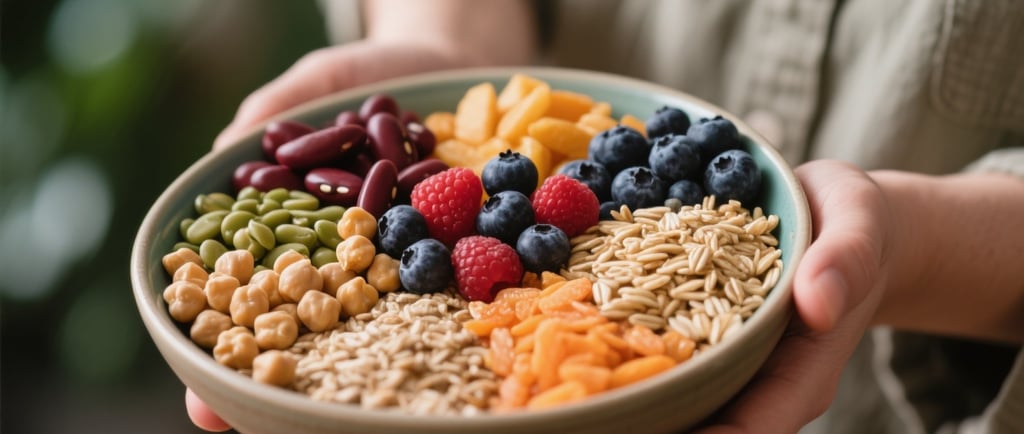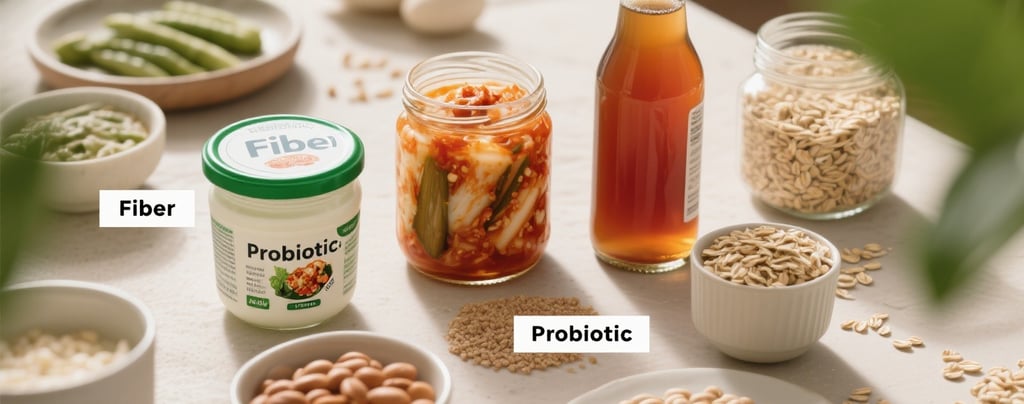Why Your Gut Health Matters: Fibremaxxing, Probiotics & Personalized Ways to Heal Your Microbiome
10/2/20254 min read


Understanding Your Gut Microbiome: The Key to Overall Health
The gut microbiome, a complex ecosystem of trillions of microorganisms residing in the digestive tract, plays an essential role in maintaining overall health. This diverse community, which includes bacteria, viruses, fungi, and other microbes, is involved in myriad bodily functions, such as digestion, metabolism, and immune response. A balanced gut microbiome supports nutrient absorption and helps regulate both physical and mental well-being.
Research has increasingly demonstrated that these microorganisms significantly influence immunity. A healthy gut microbiome contributes to the development of a robust immune system, helping defend against pathogens and reducing inflammation within the body. Conversely, imbalances in gut microbiota can manifest as digestive disorders, allergies, and autoimmune diseases, signifying the importance of maintaining gut health.
Moreover, the gut microbiome impacts mood regulation and mental health. Studies show that certain gut bacteria produce neurotransmitters, like serotonin, which are crucial for maintaining emotional stability. Disruptions in microbial diversity have been linked to anxiety, depression, and other mood-related disorders. This connection highlights the importance of nurturing a healthy gut microbiome as part of comprehensive mental health strategies.
The relationship between gut health and various conditions underscores the significance of personalized approaches to achieving and maintaining a balanced microbiome. Strategies may include dietary interventions, such as fiber intake and the consumption of probiotics, which can introduce beneficial microorganisms into the gut. As research continues to explore the profound impact of gut microbiota on overall health, understanding its intricate functions becomes paramount for both physical health and psychological well-being.
The Trend of Fibremaxxing: Fueling Your Gut with Fiber-Rich Foods
Fibremaxxing is an emerging trend focusing on the consumption of a high-fiber diet to support gut health. Dietary fiber, which is derived from plant-based foods, is essential for maintaining optimal gastrointestinal function and overall well-being. There are two primary categories of dietary fiber: soluble and insoluble. Soluble fiber dissolves in water and can be found in foods like oats, legumes, apples, and citrus fruits. It plays a crucial role in regulating blood sugar levels and lowering cholesterol. Insoluble fiber, on the other hand, does not dissolve in water and can be found in whole grains, nuts, seeds, and vegetables such as carrots and cauliflower. This type of fiber improves bowel regularity and helps prevent constipation, making both types vital for maintaining a healthy gut microbiome.
The importance of fiber cannot be overstated, as it contributes significantly to gut health by acting as a prebiotic, feeding the beneficial bacteria residing in the intestines. These bacteria play a pivotal role in digestion, nutrient absorption, and immune function. A high-fiber diet has also been associated with a lower risk of developing various gastrointestinal disorders, such as irritable bowel syndrome and colonic diseases, ultimately aiding in the creation of a balanced microbiome.
To achieve optimal gut functioning, adults should aim for a daily fiber intake of 25 to 30 grams, which can vary based on individual needs and dietary circumstances. Incorporating more fiber into your diet can be achieved through simple adjustments. Start your day with a high-fiber breakfast, such as oatmeal or whole-grain toast. Include a variety of fruits and vegetables in every meal, and opt for whole grains over refined products. Snacking on nuts, seeds, and legumes can also provide the necessary fiber boost your gut needs.
Probiotics and Prebiotics: Natural Ways to Nourish Your Gut
Maintaining a healthy gut is crucial for overall well-being, and one of the most effective ways to achieve this is through the incorporation of probiotics and prebiotics into your diet. Probiotics are live microorganisms that, when consumed in adequate amounts, provide health benefits, particularly to the digestive system. Common sources of probiotics include fermented foods such as yogurt, kimchi, sauerkraut, and kefir. These foods contain beneficial bacteria that can help restore balance to the gut microbiome, aiding digestion and potentially enhancing immune function.
Prebiotics, on the other hand, are non-digestible food components that promote the growth and activity of beneficial gut bacteria. They serve as food for these microorganisms, supporting their proliferation and overall function. Foods rich in prebiotics include garlic, onions, bananas, asparagus, and whole grains. By incorporating these foods into your meals, you provide essential nutrients for the thriving probiotics in your gut. This symbiotic relationship between prebiotics and probiotics underscores the importance of a balanced diet rich in both types of compounds for optimal gut health.
Integrating probiotics and prebiotics into your daily meals can be both simple and enjoyable. For instance, starting your day with a bowl of yogurt topped with sliced bananas not only enhances gut flora but also provides essential vitamins and minerals. Adding fermented foods like kimchi or sauerkraut to lunch or dinner can introduce new flavors while contributing to a healthier microbiome. Furthermore, cooking with garlic and onions can enhance the taste of various dishes while offering significant prebiotic benefits. These small but impactful dietary changes can lead to remarkable improvements in gut health.
Personalized Nutrition and Common Pitfalls: Enhancing Your Gut Health Journey
Personalized nutrition plays a pivotal role in enhancing and maintaining gut health, as individual dietary needs can significantly differ from person to person. To effectively tailor a nutrition plan that promotes optimal gut health, it is vital to assess individual responses to various foods. Simple methods, such as food sensitivity tests, can provide valuable insights, allowing individuals to identify specific food triggers that may compromise their gut microbiome. Also, tracking symptoms over time in relation to dietary intake can unveil patterns that inform effective nutritional choices.
Common pitfalls, however, can derail an individual's gut health journey. One significant mistake is the overconsumption of sugar and processed foods, which can lead to dysbiosis—a microbial imbalance in the gut. These foods often contribute to inflammation and can promote harmful bacteria while hindering the growth of beneficial probiotics. Hence, improving gut health begins with reducing the intake of such foods, subsequently replacing them with whole, nutrient-dense options that support a diverse microbiome.
Additionally, many people overlook the importance of adequate hydration, which can impact digestion and the overall function of the gastrointestinal tract. Staying hydrated helps maintain the mucosal lining of the intestines and facilitates the barrier that protects against pathogens. Furthermore, individuals should be wary of fad diets or extreme restrictive eating habits that can harm gut health rather than help it. Instead of shortcuts, carving out a well-rounded, sustainable diet backed by personal data will lead to more significant improvements in gut health.
In conclusion, understanding one's unique body and the factors that influence gut health is essential in this journey. Through personalized nutrition approaches and awareness of common dietary missteps, individuals can enhance their gut health effectively, fostering an environment that promotes both physical and mental well-being.


